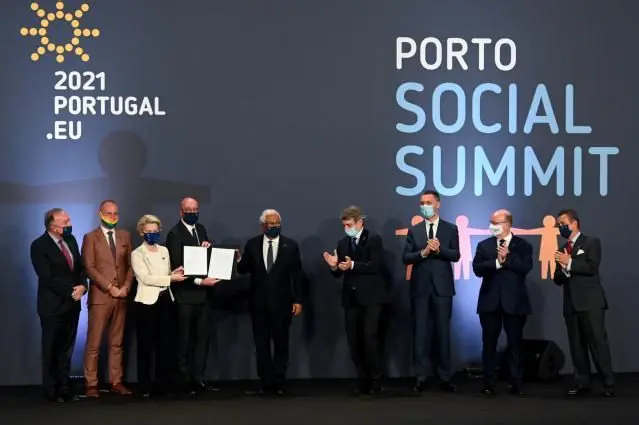Partners have signed up to the three 2030 headline targets set in the Commission’s European Pillar of Social Rights Action Plan in a joint Porto Social Commitment:
(1) At least 78% of people aged 20 to 64 should be in employment,
(2) At least 60% of all adults should participate in training every year,
(3) The number of people at risk of poverty or social exclusion should be reduced by at least 15 million, including at least 5 million children.
This commitment was taken at the first day of the Social Summit in Porto by the President of the European Commission, the President of the European Parliament, the Portuguese Prime Minister currently holding the Presidency of the Council of the EU, the European social partners and civil society organisations. They have further pledged to do their utmost to build a more inclusive, more social Europe. They welcomed the European Pillar of Social Rights Action Plan and strengthened the commitment to transform its principles into action to set in motion a strong, fair and job-rich recovery.
Today’s Summit marks a pivotal moment for social rights in Europe as social partners and civil society call on the EU Heads of State or Government to endorse the Action Plan and its headline targets and to set ambitious national targets that can adequately contribute to the achievement of the European targets.
European Commission President, Ursula von der Leyen, said: “Europe’s social targets must go hand in hand with its green and digital targets. We want to get closer to full employment, more Europeans to have access to the skills they need and ensure equal opportunities for all Europeans in a more digital and sustainable economy. The Porto Social Summit is our joint commitment to build a social Europe that is fit for our day and age and that works for everyone.”
Portuguese Prime Minister, António Costa, said: “The Porto Commitment is a commitment to the future and to hope. Today, we came to the conclusion that we will only have more prosperous and fairer societies if, along with meeting the climate and digital goals we have set ourselves, we implement our Social Pillar.”
The high-level conference will be followed by an informal meeting of EU Heads of State or Government on Saturday, 8 May.
Time to deliver
In the joint commitment, signatories welcome the European Pillar of Social Rights Action Plan presented by the Commission in early March which sets out concrete actions to further implement the 20 principles of the Pillar. It also proposes headline targets for employment, skills and social inclusion at EU-level to be achieved by 2030. The Action Plan will help Europe navigate the transformations brought about by new societal, technological and economic developments and by the socio-economic consequences of the pandemic. It will help guarantee that no one is left behind in the twin digital and climate transitions.
Focus on jobs, skills, fighting poverty and reducing social exclusion
The COVID-19 pandemic has had a far-reaching and profound socio-economic impact. So far, the collective response of Member States and the EU has helped to preserve jobs and livelihoods, as well as to contain many of the negative effects of the pandemic. However, unemployment and inequalities are likely to persist and increase. The participants of the high-level conference therefore call on EU leaders to channel resources where they are most needed.
Policymakers should focus their efforts on the recovery of employment and quality job creation, on investments into lifelong learning, enabling people to acquire new or additional skills they need to succeed in the green and digital transitions, and on reducing poverty and social exclusion by promoting equal opportunities for all.







